Dunlop makes case for indirect TPMS at Tire Technology Expo
Roughly 18 months ago as part of our 2012 TPMS feature, Tyres & Accessories asked if there was a long-term future for indirect TPMS. In conversation with one of the two biggest suppliers of this technology, Swedish firm NIRA Dynamics, we examined the case for so-called iTPMS. This year we flip things around and ahead of his forthcoming speaking engagement at Tire Technology Expo, in Cologne on 11 February, Bernd Schuchhardt, general director at Dunlop Tech GmbH (the other large indirect TPMS producer) presents the case for this technology.
According to Schurchhardt, co-operation between Bosch and Sumitomo Rubber Industries/Dunlop Tech (SRI/DT) on their indirect TPMS has reinforced this solution’s market-leading position. The system was first launched on the European market in 2003 when used in the BMW 5 series (E60) as a component of the DSC (Dynamic Stability Control). Now, the indirect TPMS system is an integrated component of selected ABS and ESC systems.
As with other systems of this kind, SRI/DT’s indirect TPMS bases its calculations on the fact that decreasing air pressure inside the tyre lowers the dynamic rolling circumference of the wheel and, therefore, can be measured directly. The system monitors tyre pressure by continuous comparison of the rolling circumferences of all four wheels. This is achieved by the ABS impulse pick-up sensor transmitting the wheel rotational speed to the evaluation software. With the second-generation of the indirect TPMS uses come further possibilities for the detection of changes in tyre characteristics as they occur when the tyre is losing air – beside the evaluation of the rolling circumference. For instance, a frequency analysis of the tyres can be carried out while in transit. This allows for the detection of any losses in tyre pressure and other changes in the condition of the tyre.
Dunlop Tech GmbH responsible for application in European models
While the respective ESC makers are responsible for the production and adjustment of the ABS/ESC components themselves, Dunlop Tech takes care of the application of the TPMS functions in vehicles manufactured in Europe. In the USA this task is assumed by Sumitomo Rubber Industries Automotive Technology (SRIAT) and in the Asian market by patent owner Sumitomo Rubber Industries Ltd. (SRI).
According to Schurchhardt, the co-operation of Bosch and Sumitomo Rubber Industries/Dunlop Tech GmbH has met with a large and positive interest among automotive manufacturers worldwide. Just like the Bosch ABS/ESC, SRI/DT’s indirect TPMS is said to have demonstrated that it is ”technically the best system”. The integration of tyre pressure monitoring can be seen in line with the development of traction and stability systems such as ASR, ASC, ESC, or DSC. Automotive manufacturers, therefore, have a sophisticated and particularly cost-efficient system at their disposal. The specifications for tyre pressure monitoring systems for passenger cars and light utility vehicles in Europe as required by legislation from 2011 on are complied with.
Dunlop Tech reports that the combination of ESC/Warnair is particularly suitable for the increasing number of vehicles that no longer have a spare wheel. Even in case of a slight loss in pressure the driver is warned and may use the tyre sealant (normally part of the vehicle’s equipment) at an early stage to avoid excessive wear.



Comments